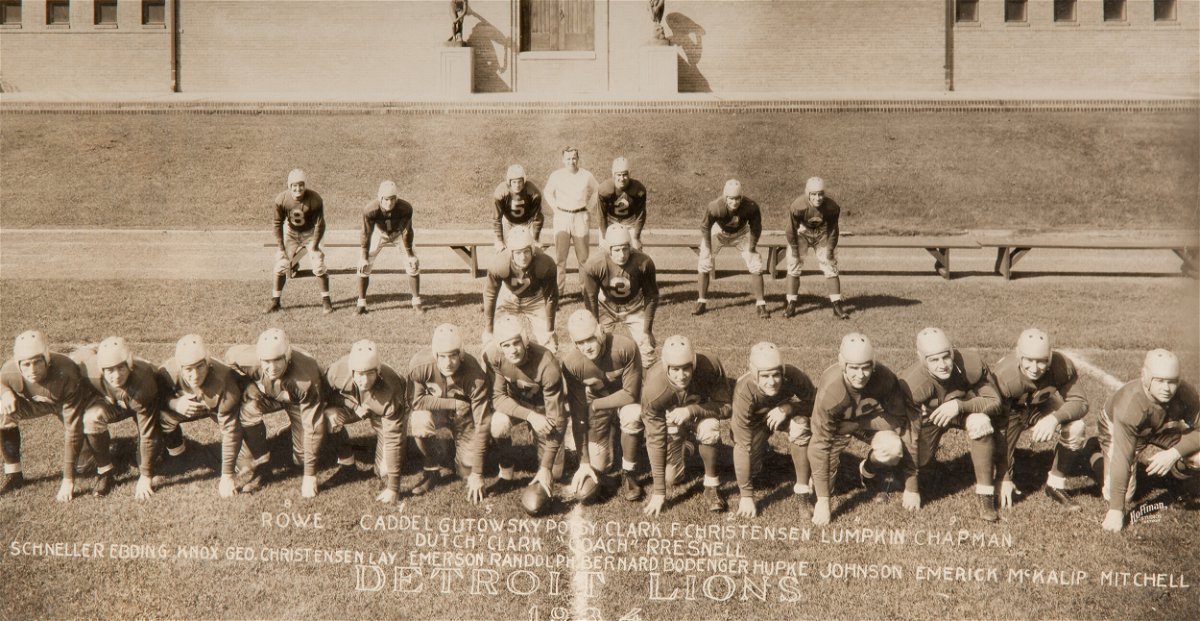How football became a Thanksgiving tradition

A Detroit Lions football team photo from circa 1934. That year
By Leah Asmelash, CNN
Thanksgiving, for many in the US, usually means a few things: food, family… and football.
Every year, millions tune in to watch the annual Thanksgiving NFL games — last year’s matchup between the Dallas Cowboys and the Las Vegas Raiders garnered an audience of 38.5 million people, the most-watched NFL regular season game since 1990. (By comparison, 33.8 million tuned in to President Joe Biden’s inauguration).
But how did America’s favorite sport become so linked to the holiday? CNN spoke with experts to find out.
The tradition actually started with college football
Football started out as an amateur sport — played mainly in elite northeastern colleges like Harvard, Princeton, Yale and Columbia, said Matthew Andrews, a history professor at the University of North Carolina at Chapel Hill.
The Thanksgiving tradition began back in 1876, when the Intercollegiate Football Association began hosting their championship game on the holiday. But the tradition didn’t begin to pick up steam until 1880, Andrews said, when the association moved the end-of-season game to New York.
It’s this game, Andrews said, that took football from a sporting event to a social one.
“This game was sort of the unofficial start of the winter holiday social season,” he said. “People from the different colleges and universities would flood New York City, and there would be pregame Wednesday night dinners and Friday and Saturday night there would be post-game balls and trips to the theater. And that’s when it really takes off, in the 1880s and the 1890s.”
And so, by the mid-1890s, college football and Thanksgiving day were synonymous.
Not everyone approved of the new tradition
Thanksgiving didn’t really become an annually celebrated holiday until 1863, when Abraham Lincoln encouraged its recognition as a way to promote unionism during the Civil War, Andrews said. The rise of Thanksgiving, then, is almost congruent with the rise of football: the holiday helped fuel the popularity of the sport, Andrews said, and in turn football made Thanksgiving a little more secular and more widely appealing.
And their alliance makes sense, Andrews said. Professional football didn’t exist yet, so the sport was intrinsically tied to communities at the high school and college level, which can foster fierce loyalties. School colors are often linked to football teams, and landmark events like homecoming are typically tied to a football game.
“Football is the sport around which communities revolve,” Andrew said. “This holiday in which we’re celebrating community, I think it makes sense that football would seamlessly fit into that culture.”
But that doesn’t mean everyone celebrated the shift.
In 1893, the New York Herald condemned the rise of football on Thanksgiving, arguing that the sport was ruining the holiday.
“Thanksgiving is no longer a solemn festival to God for mercies given,” the paper printed. “It is a holiday granted to the state and nation to see a game of football.”
NFL teams began playing on Thanksgiving to increase their popularity
At that point, football was still an amateur sport. When the NFL was founded in 1920, no one was really interested in professional football, Andrews said.
So, the league started scheduling games on Thanksgiving — drawing on pre-existing traditions to help establish the league into American consciousness. In the first decade, the NFL would schedule as many as six games on Thanksgiving, a far cry from the three games they schedule now. It was all an attempt to bring interest and notability to the sport, Andrews said.
“Of course they played on Thanksgiving, because by 1920 Thanksgiving meant football and football meant Thanksgiving,” Andrews said. “The NFL would’ve been missing a critical opportunity to popularize the game if they had not played on Thanksgiving day. It almost would’ve been un-American.”
And the strategy worked. The Detroit Lions, who play every year on Thanksgiving, first began that tradition in 1934 — done in an effort to increase their brand and put fans in the stands.
By the 1970s, Thanksgiving and NFL football were inseparable
Still, professional football hadn’t really exploded in popularity just yet. Baseball was still the most popular sport in the US. But by the 1960s, that had begun to shift, Andrews said.
It’s during that shift that the Dallas Cowboys, who also play every year on the holiday, started their Thanksgiving tradition. At the time, the Cowboys were a new team looking to build their brand and their fanbase. So in 1966, they began to host a Thanksgiving game, Andrews said, bringing instant exposure to the team.
By the 1970s, the Cowboys were the most famous football team in the US, and Thanksgiving and professional football were intrinsically linked. And still, per tradition, the Lions and the Cowboys continue to play every year on the holiday.
But eventually, other teams complained, arguing that they didn’t “get a piece of that Thanksgiving pie,” Andrews said. As a result, in 2006, the NFL added a third Thanksgiving game to the lineup, featuring rotating teams.
And these Thanksgiving games are important to fans. Last year, the Thanksgiving matchup between the Raiders and the Cowboys was the fourth most-watched telecast of 2021, behind the Super Bowl and the AFC and NFC Championships. Aside from the presidential inauguration, the top-10 most watched telecasts were all NFL games.
“Right or wrong, football is a religion in this country,” Andrews said. “And so football on Thanksgiving is sacred.”
The-CNN-Wire
™ & © 2022 Cable News Network, Inc., a Warner Bros. Discovery Company. All rights reserved.